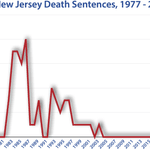
State & Federal
New Jersey

Notable Commutations/Clemencies
In 2007, the sentences of all 8 inmates on death row were commuted to life without parole the day prior to the abolition of the death penalty in New Jersey.
Inmates commuted: David Cooper, Ambrose Harris, Nathaniel Harvey, Sean Kennety, John Martini, Jessie Timmendequas, Marko Bey and Brian Wakefield.
Milestones in Abolition/Reinstatement
A state appeals court ruled in 2004 that New Jersey’s procedures for administering the death penalty were unconstitutional. The state rewrote the procedures but never finalized them, and they expired in 2005.
In 2005, New Jersey lawmakers voted to suspend executions while a study commission examined the fairness and expense of the state’s death penalty. Governor Richard Codey signed the bill on January 12, 2006.
In 2007, a bill to replace the death penalty with life without the possibility of parole passed the state Senate and General Assembly and was signed by the governor.
New Jersey was the first state to legislatively abolish the death penalty since 1965.
Other Interesting Facts
The first electric chair was invented by Harold P. Brown and Arthur Kennelly at Thomas Edison’s New Jersey laboratory in 1888.
No executions were carried out in New Jersey between reinstatement in 1982 and abolition in 2007.
New Jersey was the first state to impose a moratorium on executions through legislation.


Resources

News & Developments
News
Jan 12, 2018
Experience Shows No “Parade of Horribles” Following Abolition of the Death Penalty
States that have recently abolished the death penalty have not experienced the“parade of horribles” — including increased murder rates — predicted by death-penalty proponents, according to death-penalty experts who participated in a panel discussion at the 2017 American Bar Association national meeting in New York City. Instead, the panelists said, abolition appears to have created opportunities to move forward with other broader…
Read MoreNews
Dec 28, 2017
Judge Finds New Jersey Federal Capital Defendant Intellectually Disabled, Bars Death Penalty
A New Jersey U.S. district court judge has barred federal prosecutors from seeking the death penalty against Farad Roland, finding that Roland is intellectually disabled and therefore ineligible for capital punishment. After an eighteen-day evidentiary hearing featuring sixteen witnesses, Judge Esther Salas ruled on December 18 that Roland — accused of five killings in connection with a drug-trafficking gang — had…
Read MoreNews
Dec 18, 2017
New Jersey Marks Tenth Anniversary of Abolition of Capital Punishment
On December 17, 2007, New Jersey abolished the death penalty. On the tenth anniversary of abolition, the editorial board of the New Jersey Law Journal writes,“On the Death Penalty, New Jersey Got it Right.” The editorial board wrote,“Abolition has proven its worth, in that there has been no surge of murders, a significant decline of prosecution and appeal expenses, and the elimination of unremediable judicial mistakes.
Read MoreNews
Jul 23, 2012
INNOCENCE: State Supreme Court Takes Lead on Eyewitness Identification Errors
One of the principal causes of wrongful convictions in death penalty cases and other felonies is mistaken eyewitness testimony. On July 19, the New Jersey Supreme Court issued instructions designed to help jurors better evaluate the reliability of eyewitness identifications. A judge is now required to tell jurors before deliberations begin that stress levels, distance, or poor lighting can affect an eyewitness’s ability to make an…
Read MoreNews
May 30, 2012
NEW VOICES: New Jersey Attorney General Does Not Want Death Penalty Back
Jeff Chiesa was recenty sworn in as New Jersey’s new Attorney General. He formerly served as chief counsel and executive assistant to Governor Chris Christie. In discussing his priorities, he said he would not support reinstatement of the death penalty. Chiesa said his opinion on the topic had evolved over the years and he would not support restoring it in the state. New Jersey abolished the death penalty in 2007, becoming the first state to enact such legislation in…
Read More

